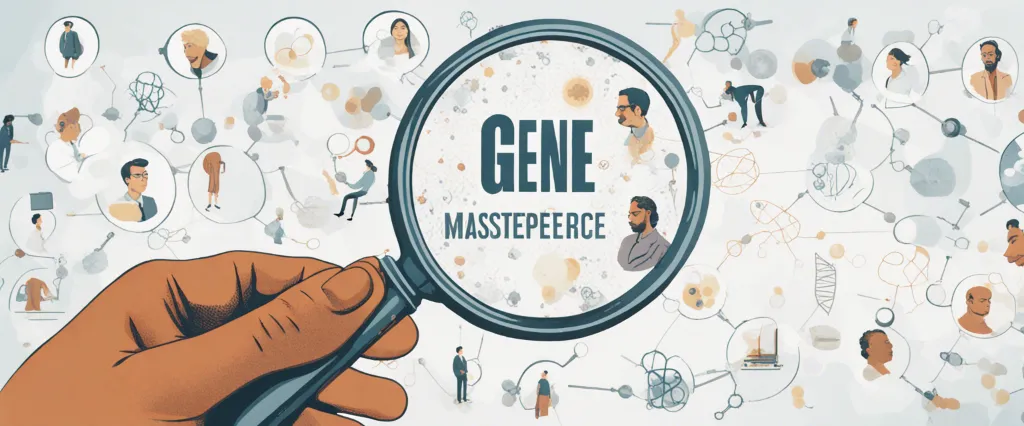——The Gene by Siddhartha Mukherjee & Evolutionary Psychology by David M. Buss

In the realm of science and human understanding, two compelling works have emerged that delve into the intricacies of our existence and shed light on the fundamental forces that shape our behavior. Siddhartha Mukherjee’s “The Gene” and David M. Buss’s “Evolutionary Psychology” are two thought-provoking books that explore the relationship between genes, evolution, and their impact on our lives.
“The Gene: An Intimate History” by Siddhartha Mukherjee takes us on a captivating journey through the history of genetics, investigating how our understanding of genes has evolved over centuries. Mukherjee, a renowned physician and Pulitzer Prize-winning author, skillfully weaves together stories of scientific discovery, personal memoir, and ethical dilemmas associated with genetic advancements. By examining the role of genes in both health and disease, Mukherjee compels us to reflect on the profound implications of our genetic makeup.
In contrast, David M. Buss’s “Evolutionary Psychology: The New Science of the Mind” delves into the evolutionary roots of human behavior. Buss, a distinguished professor and influential evolutionary psychologist, delves into the primal forces that have shaped our psychological landscape. By exploring topics such as mating strategies, aggression, and cooperation, Buss offers compelling insights into the evolutionary underpinnings of our complex minds.
While both books touch upon genes and evolution, they diverge significantly in their focus and approach. Mukherjee’s “The Gene” primarily explores the intricate mechanisms of genetic inheritance and the impact of genes on our physical and mental health. On the other hand, Buss’s “Evolutionary Psychology” delves into the evolutionary forces that have shaped our psychological makeup, examining the adaptive functions of various behaviors.
Through this comparative study, we aim to analyze the unique contributions of these two works in furthering our understanding of genetics, evolution, and their profound influence on human beings. By examining the distinct perspectives and methodologies employed by Mukherjee and Buss, we hope to glean valuable insights into the intricate relationship between our genetic blueprint and the evolutionary forces that have shaped our behavior and minds.
By juxtaposing these two captivating works, we embark on a journey of scientific exploration that combines the power of genetics and evolution to offer a holistic view of the intricacies of human existence. Together, “The Gene” and “Evolutionary Psychology” provide us with a comprehensive framework for understanding not only who we are but also how we have come to be.
Brief Summary of Two Books
The Gene by Siddhartha Mukherjee
The Gene: An Intimate History” by Siddhartha Mukherjee is a comprehensive exploration of the history, science, and implications of genetics. The book delves into the fascinating story behind the discovery of genes and the unraveling of their complex mechanisms.
Mukherjee begins by examining the origins of genetics, starting with the work of Gregor Mendel and exploring how ancient civilizations observed and manipulated genetic traits. The narrative then transitions into the modern era, tracing the groundbreaking discoveries made by scientists such as James Watson and Francis Crick, who unraveled the structure of DNA.
The book navigates through the intricate world of genes, discussing topics like genetic inheritance, hereditary diseases, genetic testing, and the role of genes in determining various traits and behaviors. Mukherjee delves into the impact of genetic research, including the development of gene therapy, the ethical controversies surrounding genetic engineering, and the potential future implications of genetic advancements.
Throughout the book, Mukherjee weaves in personal stories from his own family’s experiences with mental illness, which adds a deeply personal touch to the narrative. He reflects on the genetic basis of various conditions and our evolving understanding of mental health.
By examining both the scientific and social aspects of genetics, Mukherjee provides readers with a thought-provoking and engaging exploration of the profound influence genes have on our lives and society. “The Gene” is a captivating blend of historical anecdotes, scientific explanations, and personal reflections that sheds light on the past, present, and future of genetics.
Evolutionary Psychology by David M. Buss
Evolutionary Psychology, written by David M. Buss, explores the central ideas and principles of evolutionary psychology and how they provide insights into human behavior. The book discusses the evolutionary explanations for various psychological phenomena, such as mate selection, parenting, aggression, cooperation, emotions, and cognition.
Buss begins by elaborating on the history and foundations of evolutionary psychology, highlighting how our evolutionary past has shaped our present behavior and psychology. He then presents evidence from various fields, including anthropology, psychology, and biology, to support the evolutionary explanations proposed.
The book describes the concept of sexual selection and how it has influenced mating preferences and strategies in both males and females. Buss emphasizes that males and females face different adaptive challenges and have different evolutionary goals, leading to differences in mate choice, jealousy, sexual strategies, and parental investment.
Buss also explores the topic of aggression, explaining how evolutionary factors have shaped our aggressive tendencies and the contexts in which aggression can be adaptive. The book further delves into the evolutionary roots of altruism, cooperation, and social relationships, highlighting the benefits of group living and reciprocal behaviors.
The author discusses emotions from an evolutionary perspective, arguing that emotions are adaptive responses that have evolved to serve different functions, such as facilitating social bonding, solving adaptive problems, or signaling threats.
Lastly, Buss addresses the evolutionary underpinnings of cognition, including language, reasoning, memory, and decision-making. He explores how the mind has evolved to process information and make decisions that increase survival and reproductive success.
Throughout the book, Buss presents and discusses various research studies, theories, and debates in the field of evolutionary psychology. He also raises important ethical considerations and potential criticisms of the evolutionary approach to understanding human behavior.
Overall, Evolutionary Psychology by David M. Buss offers a comprehensive and accessible overview of the evolutionary principles that shape human psychology, providing valuable insights into an array of psychological phenomena.
Comparison between Two Books

Similarities in Mysteries of Our Body
In “The Gene” by Siddhartha Mukherjee and “Evolutionary Psychology” by David M. Buss, both authors explore the mysteries of our body from different angles, shedding light on intriguing aspects of human existence. While these books differ in their specific focuses, there are several similarities in how they approach the subject.
1. Interdisciplinary Approach: Both books draw on a wide range of scientific disciplines to unravel the mysteries of our body. Mukherjee delves into genetics, molecular biology, and medicine, while Buss integrates evolutionary biology, psychology, and anthropology. By incorporating diverse fields of study, both authors provide a comprehensive understanding of the complexities underlying different aspects of the human body.
2. Scientific Inquiry: Mukherjee and Buss approach the mysteries of our body with a scientific mindset, using empirical evidence and rigorous research to support their claims. They rely on experiments, case studies, evolutionary theory, and other scientific methodologies to investigate and explain the phenomena they explore. This evidence-based approach ensures that the information presented is grounded in scientific rigor.
3. Historical Context: Both authors recognize the importance of historical context in understanding the mysteries of our body. They provide a historical backdrop and trace the development of scientific knowledge in their respective fields. By discussing key discoveries and theories, they highlight the progression of scientific understanding, thereby placing the mysteries of our body within a broader context.
4. Cognitive and Behavioral Implications: Mukherjee and Buss recognize the implications of their investigations for human behavior and cognition. Mukherjee explores how genetic factors affect our individuality, health, and susceptibility to diseases. Buss, on the other hand, examines how evolutionary psychology influences sexual behavior, mate preferences, and social interactions. In addressing these implications, both authors emphasize the impact of genetic makeup and evolutionary history on our bodies and minds.
5. Communication of Complex Science: Both books strive to make complex scientific concepts accessible to a broader audience. While maintaining scientific accuracy, Mukherjee and Buss use clear and engaging language to communicate their ideas effectively. They employ storytelling techniques, analogies, and relatable examples to simplify complex scientific concepts, ensuring that readers can grasp the mysteries of our body without prior expertise in the respective fields.
While the specific topics may differ, “The Gene” by Siddhartha Mukherjee and “Evolutionary Psychology” by David M. Buss share several similarities in approaching the mysteries of our body. Their interdisciplinary perspectives, empirical approach, historical context, focus on cognitive and behavioral implications, and efforts to communicate complex science to a wider audience create an engaging exploration of our remarkable existence.
Divergences in Mysteries of Our Body
“The Gene” by Siddhartha Mukherjee and “Evolutionary Psychology” by David M. Buss are two books that delve into different aspects of science and human nature. While both books touch upon mysteries related to the human body, they approach the topic from diverging perspectives.
In “The Gene,” Siddhartha Mukherjee focuses on unraveling the mysteries of genetics and its impact on our biological makeup. The book explores the complex ways genes shape our lives, often delving into the underlying scientific research and historical context. Mukherjee examines how genes influence our susceptibility to certain diseases, behavioral traits, and even our individuality. He dives deep into the intricate workings of genes, including the fascinating discovery of how they mutate and evolve over time. By interweaving personal anecdotes, historical accounts, and scientific breakthroughs, Mukherjee aims to demystify the role of genes in our lives and provide a comprehensive understanding of the subject.
On the other hand, David M. Buss’s “Evolutionary Psychology” takes a broader perspective, centering on the mysteries related to human behavior and psychological processes. Buss explores how various aspects of our behavior, such as aggression, mating preferences, and parental care, can be traced back to evolutionary adaptations. He investigates the genetic and environmental factors that shape our psychology and seeks to answer fundamental questions about human nature. Buss delves into the adaptations that have been favored by natural selection throughout our evolutionary history, offering insights into why we behave the way we do.
Despite addressing different aspects of science, both books touch on the mysteries surrounding the human body. “The Gene” focuses on the mysteries of our genetic makeup, examining how variations in our genes influence our physical and behavioral traits. On the other hand, “Evolutionary Psychology” delves into the mysteries of human behavior, exploring how our evolutionary history has shaped our psychological processes. While “The Gene” looks inward to our genetic code, “Evolutionary Psychology” takes a broader perspective of the various forces that have shaped our minds and behaviors.
In essence, “The Gene” and “Evolutionary Psychology” approach the mysteries of the human body from different angles. Mukherjee’s book focuses primarily on the inner workings of genes and their impact at the individual level. Buss, on the other hand, takes a more holistic approach by examining the evolutionary forces that have sculpted our psychology and behavior. Both books offer unique insights into the mysteries surrounding our bodies but explore different dimensions of the subject matter.

Conclusion
“The Gene: An Intimate History” by Siddhartha Mukherjee is a widely acclaimed book that explores the history and impact of genetics on human life. It delves into the science behind genes and how they shape our identities, behavior, and even our future. This book received positive reviews for its clear explanations and engaging storytelling style, making it accessible to both scientific and non-scientific readers.
“Evolutionary Psychology: The New Science of the Mind” by David M. Buss is another popular book that explores the connection between evolution and human behavior. Buss, a well-known evolutionary psychologist, examines various aspects of human psychology, from mate selection and relationships to aggression and cooperation. The book combines scientific research with real-life examples to provide insights into our evolutionary past and how it influences our present behavior.
Both books offer valuable perspectives on different aspects of human existence: genetics and psychology. The choice between them ultimately depends on your personal interests and which subject you find more intriguing. If you are particularly fascinated by the science of genes, and how they influence our lives, “The Gene” may be the better choice. On the other hand, if you are more interested in evolutionary psychology and understanding the evolutionary roots of human behavior, “Evolutionary Psychology” could be the more suitable book for you.
In summary, both books have received positive reviews and are considered significant contributions to their respective fields. Consider your interests and what you hope to learn from the book to make a decision on which one to read.


